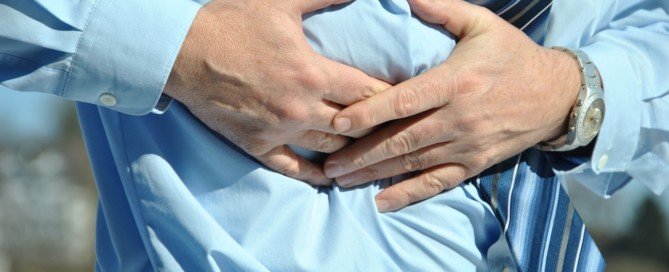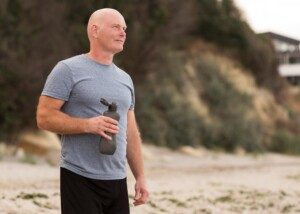Deadliest Brain Tumor: Glioblastoma Multiforme vs. DIPG

The DIPG brain tumor is the deadliest – more vicious than glioblastoma multiforme.
What makes diffuse intrinsic pontine glioma especially brutal is that most diagnoses occur in children between age five and nine. (more…)
Why Does Acid Reflux Interfere with Breathing in Healthy People?

You already know acid reflux can sometimes cause problems with breathing, but just how does this happen in otherwise healthy people?
There’s more than one way that acid reflux—or the more serious variant, GERD, can interfere with breathing. (more…)
When Is Anemia a Symptom of Cancer?

Some cancers can cause anemia when they cause internal bleeding or disrupt red blood cell production and function.
Anemia is the inadequate supply of healthy red blood cells.
Anemia can be caused by many factors, and one of them is cancer.
If a person suspects anemia due to having symptoms such as tiring easily, getting winded easily, pale skin, dizziness and chest pain, they may jump to the conclusion they have cancer – if they know that cancer is associated with some cases of anemia.
However, anemia normally has non-malignant causes such as an intestinal ulcer, menstruation, poor diet and low iron levels. But some non-malignant causes are serious such as liver disease or lupus.
When Cancer Is Associated with Anemia
The association is infrequent, but the explanation is that “Any advanced cancer can cause anemia by causing inflammation, causing bone marrow suppression and decrease in production of red cells or sometimes destruction of red cells,” says Mark Levandovsky, MD, Founder and Medical Director of Preventive Medicine and Cancer Care. Dr. Levandovsky is a board certified internist and oncologist/hematologist in practice for 20 years.
“In a more advanced setting bleeding is also possible, with anemia as a result,” continues Dr. Levandovsky.
Some cancers that can result in anemia.
• Cervical
• Colon
• Head and neck
• Leukemia
• Lymphoma
• Metastases to the bone marrow
• Myeloma
• Prostate
• Urinary tract
• Vaginal
“Typically, for anemia to be present, cancer burden would be significant enough for other symptoms to be noted also…so anemia alone would be atypical,” says Levandovsky.
:Potential exceptions may be gastrointestinal cancers, especially colorectal ones – where early stage cancers can cause iron-deficiency anemias without other symptoms.”
If your doctor, during a routine physical or an exam for a benign condition, happens to mention that you look really pale and wants to order a blood test for anemia, do not panic.
It’s logical to suppose that dermatologists would make this observation less frequently than would physicians of other specialties, as they would more likely associate pale skin with healthy skin (the paleness suggesting low sun exposure), while skin “with color” could suggest overexposure to the sun.
The doctor who ordered a blood test for me, due to my pale facial skin (low sun exposure and no makeup) was an OBGYN. My blood test was normal.
But it’s good when doctors are making these observations when the patient is being examined for an unrelated issue.

Dr. Levandovsky provides personalized care to health conscious individuals as well as cancer patients and survivors, focusing on an integration of genetic/molecular risk assessments, prevention, education, nutrition and psycho-oncology.
 Lorra Garrick has been covering medical, fitness and cybersecurity topics for many years, having written thousands of articles for print magazines and websites, including as a ghostwriter. She’s also a former ACE-certified personal trainer.
Lorra Garrick has been covering medical, fitness and cybersecurity topics for many years, having written thousands of articles for print magazines and websites, including as a ghostwriter. She’s also a former ACE-certified personal trainer.
.
Top image: Shutterstock/uzhursky
Sources:
everydayhealth.com/anemia/anemia-cancer-link.aspx
cancer.org/treatment/treatments-and-side-effects/physical-side-effects/low-blood-counts/anemia.html
What Does Early Detection Mean for Melanoma?

Here’s a simple explanation of what exactly “early detection” of melanoma means.
Melanoma is actually highly curable when caught early.
The problem is that the opportunities for an early detection are often passed over! (more…)
What Causes Angina Threshold to Change During Exercise?

Here are two explanations for what can cause angina threshold to change during exercise or physical activity.
Angina refers to chest pain, usually from blocked arteries causing impeded blood flow through the heart. (more…)
What Can a Mass on the Pancreas Be Other than Cancer?

“There are many different types of masses that can occur in the pancreas,” says Jordan Winter, MD, a hepato-pancreatic-biliary and oncology surgeon and Chief of the Division of Surgical Oncology at University Hospitals Cleveland Medical Center.
“However, the majority of asymptomatic masses are benign and are typically benign cysts,” says Dr. Winter.
However, if a cancerous mass is discovered on the pancreas, there’s an 85 percent chance that it will be the deadly adenocarcinoma.
“If a patient presents with jaundice [yellowing of the skin] and a mass, there is a about a 90 percent chance” that the mass will be malignant, adds Dr. Winter.
“Masses can be tumors [benign or malignant] or non-tumors,” says Dr. Winter.
“Those masses that aren’t tumors can be simple cysts or pancreatitis. Benign tumors can be solid or cystic (sacs with fluid).”
Most Deadly
About 30,000 people in the U.S. are diagnosed every year with an adenocarcinoma — the deadliest of pancreatic cancers, comprising 85 percent of all the tumors that are found in this organ.
Other Pancreatic Masses
“Solid benign tumors include low grade neuroendocrine tumors,” says Dr. Winter.
“Cystic benign tumors have complex names like intraductal papillary mucinous neoplasms, mucinous cystic neoplasms, serous cystadenomas, and solid and cystic pseudopapillary tumors.”
Cystic tumors comprise the majority of masses found in the pancreas.
“Two to three percent of people walking around in their 60s likely have an asymptomatic, benign and not worrisome cyst,” says Dr. Winter.
Dr. Winter also explains, “Many of these benign cysts can develop into cancer over time, but they do not in the majority of cases.
“Therefore, sometimes we recommend removing them, but not always.”
Most pancreatic cysts are mucinous, and these are usually benign.
But if untreated they will likely turn malignant.
A cyst is defined as a non-solid mass.
“Cysts occur equally in men and woman,” says Dr. Winter.
“There are certain rare cystic tumors that are more common in woman, including mucinous cystadenomas and solid and pseudopapillary tumors.”
Serous cystadenoma. This has a distinct honeycomb appearance on a CT scan and is usually benign.
Papillary cystic neoplasm. These are precancerous lesions that need to be removed; otherwise they may morph into adenocarcinoma.
“Solid malignancies of the pancreas include conventional ductal adenocarcinoma and pancreatic neuroendocrine tumors.”
Pancreatic pseudocyst. This is a benign collection of fluid around the organ and is associated with pancreatitis.
“Again, all masses should be evaluated by a pancreatic surgeon or pancreatic gastroenterologist, but the majority are not cancer.”
 In addition to surgical management of pancreatic and related cancers, Dr. Winter treats other upper gastrointestinal malignancies and abdominal tumors. He has authored over 100 peer-reviewed articles, many on pancreatic cancer.
In addition to surgical management of pancreatic and related cancers, Dr. Winter treats other upper gastrointestinal malignancies and abdominal tumors. He has authored over 100 peer-reviewed articles, many on pancreatic cancer.
 Lorra Garrick has been covering medical, fitness and cybersecurity topics for many years, having written thousands of articles for print magazines and websites, including as a ghostwriter. She’s also a former ACE-certified personal trainer.
Lorra Garrick has been covering medical, fitness and cybersecurity topics for many years, having written thousands of articles for print magazines and websites, including as a ghostwriter. She’s also a former ACE-certified personal trainer.
.
Top image: Shutterstock/uzhursky
Sources:
surgery.usc.edu/divisions/tumor/pancreasdiseases/pancreas%20cancer%20overview.html
surgery.usc.edu/divisions/tumor/pancreasdiseases/web%20pages/PANCREATITIS/pancreatic%20pseudocys1.html
pathology.jhu.edu/pc/BasicTypes2.php?area=ba
mayoclinic.org/diseases-conditions/pancreatic-cysts/basics/definition/con-20024331
ncbi.nlm.nih.gov/pmc/articles/PMC3848054/
ncbi.nlm.nih.gov/pmc/articles/PMC3772258
Time It Takes for Pancreatic Cancer to Cause Symptoms

Pancreatic cancer is usually diagnosed after it starts causing symptoms, but does this mean it necessarily grows faster than “less deadly” cancers? (more…)
Accutane Can Cause Tinnitus? Case Report that It Does

Yes, Accutane can definitely cause tinnitus, as was the case of a 15-year-old boy who developed the ringing in his ears.
Tinnitus has been commonly described as any of the following sounds that only the sufferer can hear in the case of subjective noise: (more…)
How to Spot a Melanoma that’s Flesh or Pink Colored

Some melanomas are flesh or pink in color; not always an “ugly black” or “scary brown.”
So how can we spot a pinkish-beige melanoma during self-exams of the skin?
“An amelanotic melanoma can appear pink or flesh colored and is very difficult to diagnose on clinical grounds alone,” says Adarsh Vijay Mudgil, MD, double board certified in dermatology and dermatopathology, and founder of Mudgil Dermatology in NY.
“In a high-risk individual, strong genetic history of melanoma and lots of sun damage, biopsying any new, flesh or pink colored bump is generally good practice.”
University of North Carolina Lineberger Comprehensive Cancer Center scientists wanted to find out just how to spot an amelanotic melanoma.
A melanoma that’s described as being flesh colored or the same tone as one’s skin (which can have a pink tinge) is called an amelanotic melanoma because the “a” means the opposite of, and “melanotic” refers to pigment.
Due to the relative invisibility of amelanotic melanomas, they are more often diagnosed at advanced stages when compared to tumors in a brown or dark range of hues.
This means that this particular melanoma is associated with poorer survival rates.
Pink Colored Melanoma Facts
• Sometimes referred to as “invisible” melanoma. Technically it’s not invisible, of course, but because they’re difficult to spot during an exam, they’re called invisible.
• Two to eight percent of all melanomas are amelanotic.
• Most occur in white patients and start growing as pink — which can be a light pinkish-flesh color, a pinkish red and any shade in between.

• It can even escape detection by a dermatologist conducting a routine skin exam because its color makes its irregular borders and asymmetry more difficult to notice with the naked eye.
“We wanted to identify patients at higher risk for amelanotic melanoma in whom we need to look carefully for this cancer type,” says Nancy E. Thomas, MD, in the study report.
How to Detect Pink Melanoma: Study
The amelanotic melanomas of 178 patients were analyzed. People with certain traits were found to have a higher chance of having this pink tumor.
• Lack of moles on the back
• Many freckles
• Red hair, light eyes
• Inability to tan
People with red or strawberry blonde hair who cannot tan usually have the so-called peaches and cream complexion.

Blondes and even people with brown shades of hair may have this complexion as well.
This complexion has a vague pink tinge to it, and this pink gets more pronounced when the person has been in the sun without sun protection.
The more pronounced the “peaches” part of the complexion becomes, the harder it gets to detect an invisible melanoma, though again, sometimes these tumors are a dark pink or reddish.
People with these traits need to be carefully screened by a dermatologist.
If you have these associated traits, make sure to give your skin a thorough visible sweep from head to toe on a monthly basis.
 Dr. Mudgil treats infant to geriatric patients, and is versed in all aspects of medical, surgical and cosmetic dermatology. He has published extensively in the medical literature plus has lectured at numerous national meetings.
Dr. Mudgil treats infant to geriatric patients, and is versed in all aspects of medical, surgical and cosmetic dermatology. He has published extensively in the medical literature plus has lectured at numerous national meetings.
 Lorra Garrick has been covering medical, fitness and cybersecurity topics for many years, having written thousands of articles for print magazines and websites, including as a ghostwriter. She’s also a former ACE-certified personal trainer.
Lorra Garrick has been covering medical, fitness and cybersecurity topics for many years, having written thousands of articles for print magazines and websites, including as a ghostwriter. She’s also a former ACE-certified personal trainer.
.
Source: sciencedaily.com/releases/2017/08/170809140114.htm
Can You Be Too Old to Get Prostate Cancer?






































































